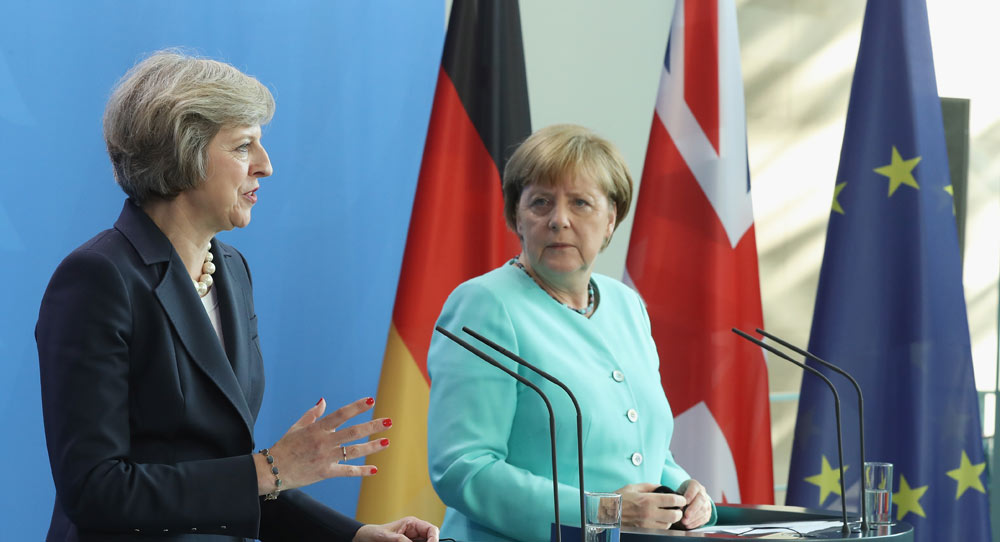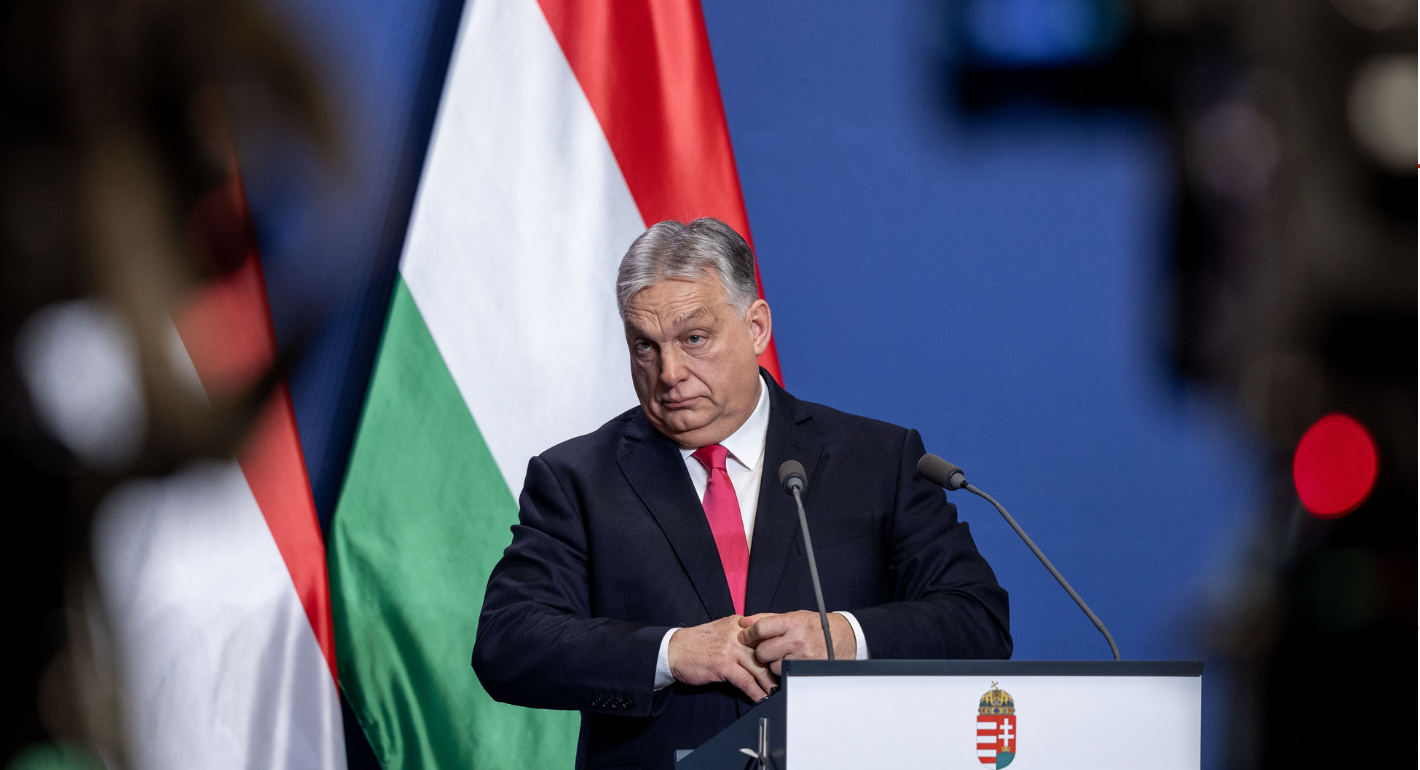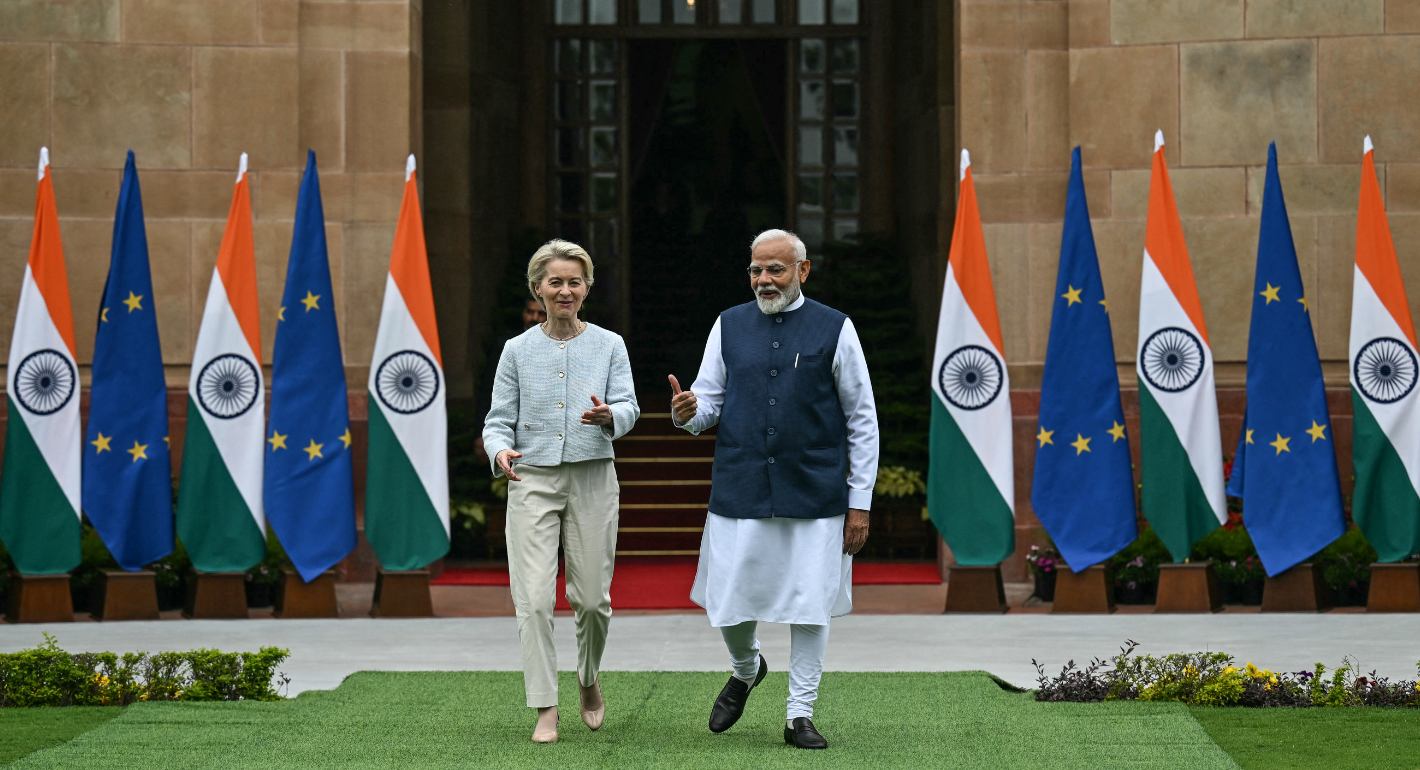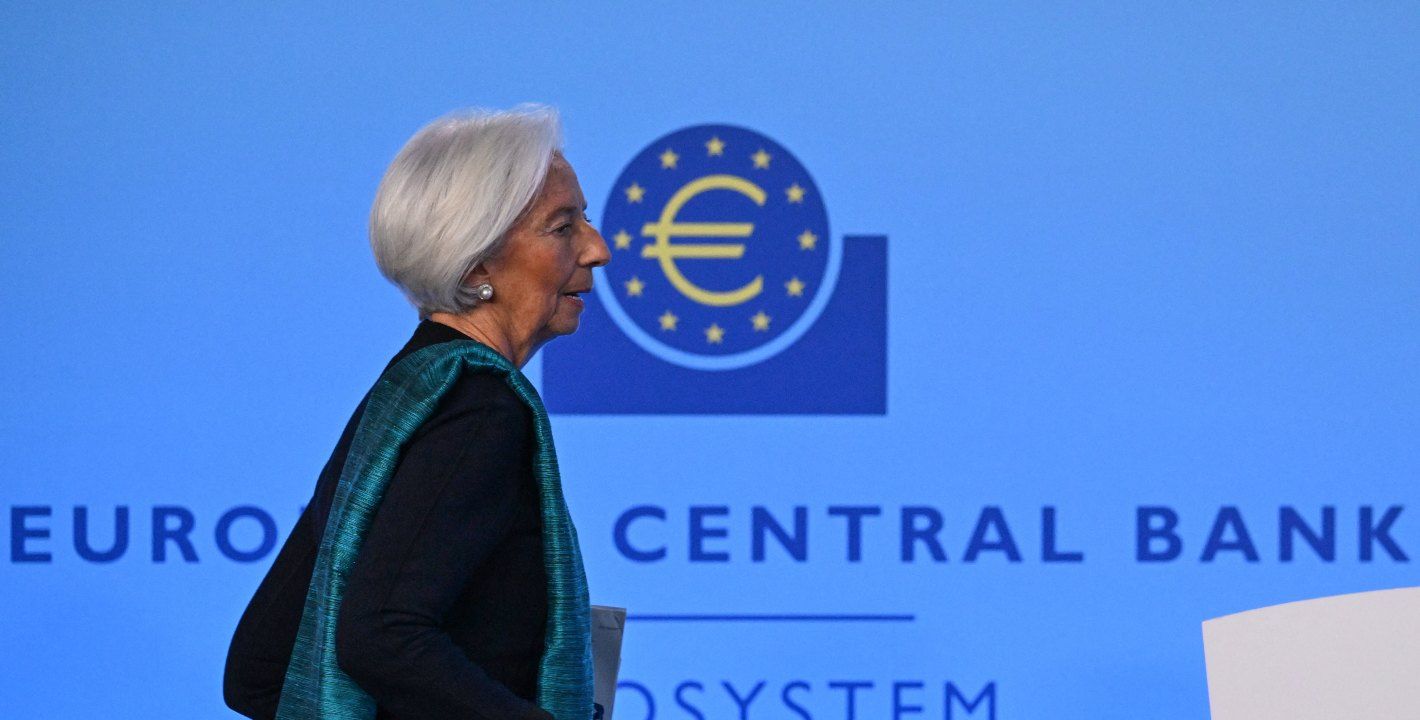Fraser CameronDirector of the EU-Asia Centre
May needs not only Merkel but all 27 member states and the EU institutions. It has been a running error of British foreign policy for decades to think that solutions can be found in Berlin without consulting others.
Merkel has made it crystal clear that her priorities are preserving a strong and coherent EU—not helping an increasingly anti-EU Tory party out of a hole of its own making.
The EU has demonstrated remarkable cohesion so far on Brexit. But inevitably some differences will emerge as the UK’s decision to leave the EU affects some member states more than others—especially Ireland.
May has to understand that all roads to Brexit go through Brussels, not Berlin.
Charles GrantDirector of the Centre for European Reform
No, Theresa May needs to impose some discipline and unity on her own troops in order to achieve a workable deal. On the Article 50 divorce settlement, the two sides are close to agreement. May will have to be more explicit on taking responsibility for outstanding financial obligations, such as contingent liabilities and pensions. That means facing down hard-line Brexiteer ministers. Then the EU will talk about transition and trade.
The bigger problem is the future EU-UK relationship. May and her ministers have not yet worked out what they want, but they are heading toward demanding a bespoke deal that is like the EU-Canada FTA but much better in terms of access to parts of the single market for services. They are in for a shock. The EU will not allow the UK to “cherry-pick” parts of the single market—even if it offers money and accepts ECJ rulings. Merkel and most EU leaders see the single market as an all-or-nothing package. The German chancellor takes a hard line and will not ride to the British prime minister’s rescue. May needs to forge a strategy for the future that is based on reality, and then start to lower the public’s expectations on what can be achieved.
Kirsty HughesDirector of the Scottish Centre on European Relations
Theresa May does not appear to know what sort of future relationship she wants the UK to have with the EU 27—especially in terms of a trade deal. Her cabinet is split into warring factions with Chancellor Philip Hammond wanting, apparently, an “EEA-minus” deal; and the Johnson-Gove-Fox triumvirate torn between the heady freedom of “no deal” and a free trade agreement.
Angela Merkel is not in a position to resolve the irreconcilable, emotional divisions within the Tory party on trade or on money (any more than any Tory party leader in the last 30 years). But the fact that money is the most sensitive of the three exit deal issues is no surprise—nor is the likelihood that a compromise deal on the divorce bill may need political input from EU leaders. So Merkel may be important in finding a way through negotiations, but the chancellor’s top priority will remain EU 27 unity—not helping May out.
While the chaos of “no deal” is certainly not in the EU 27’s interests, a breakdown in talks and the prospect of “no deal” in early 2018 could sharply increase the chances of halting Brexit and bringing British (mainly English) politics to its senses.
But does Merkel want the UK back?
Peter KellnerJournalist, political commentator, and former president of YouGov
The short answer is: of course, Theresa May needs Angela Merkel for a Brexit deal. No major decision about the future of the EU can be taken without Germany’s agreement or, at least, its acquiescence. If the German chancellor continues to play hardball with the UK over the Brexit negotiations, along with French President Emmanuel Macron, then the prime minister will continue to be in trouble.
Even if Merkel softens her stance a little, the chancellor’s past record suggests that if she has to choose between defending the principles that underpin the EU and helping a British prime minister in trouble, she will do little to help the UK. Witness the way she did little to help David Cameron, when May’s predecessor was seeking to adjust the freedom of movement rules ahead of last year’s UK referendum.
Now there is even less reason for Merkel to soften her stance. Cameron negotiated from a position of domestic strength: he had just won an unexpected outright victory in the May 2015 general election. May is negotiating from a position of domestic weakness, having called a snap election and lost her majority in parliament. The UK prime minister may not be able to win a majority at Westminster for a compromise deal.
Plainly, Merkel would be mad to make big concessions to the UK to secure a deal that May might not be able to implement at home. And one thing (among many others) we know about Merkel is that she is not mad.
Andreas KluthEditor-in-chief of Handelsblatt Global
Angela Merkel’s blessing is necessary but not sufficient for Theresa May to seal an acceptable Brexit deal. It is necessary because Merkel certainly has enough clout to block any agreement. It is not sufficient because the German chancellor does not have enough clout to sway all, or even most, of the EU’s other 26 leaders.
The real question is how Merkel defines Germany’s interests in the Brexit ordeal. Britons consistently make the mistake of overestimating the importance of Anglo-German economic ties in Merkel’s thinking. In fact, Merkel and most Germans have already accepted Brexit and its manageable cost to the Germany economy. They now care only about preserving the coherence of the remaining EU. Any tactical attempt by the UK to try to divide the EU 27 by wooing Merkel separately would backfire, for Merkel could never countenance that appearance.
The best path for the UK—as London may be shocked (shocked!) to discover—would be to come up with a clear and realistic proposal about the terms of an exit, and then to negotiate with Brussels.
Denis MacShaneFormer UK minister for Europe
No. Clearly there will be no deal on Brexit without Berlin’s approval. But Merkel is bogged down in coalition formation and too many of her ministers, top MEPs, and German business leaders have said that the UK cannot have what May would like—which is for the UK to be able to repudiate the EU but keeping all the advantages of being a member, while accepting no reciprocal obligations or membership costs.
The idea of a deal whereby both sides reach a 50/50 compromise may be a false concept. The EU is a legal construct as much as it is a political one: a “Rechtsgemeinde,” or community of laws. You cannot arrive in America and announce, “I will obey these laws and not those. I will pay some taxes but not others.” The real negotiation, or real deal, May needs to begin to seek is with her 315 Tory MPs, the still-dominant offshore owned press that the BBC takes its cues from, and (more broadly) with the British people.
Merkel cannot help solve the question: How can Britain’s Conservatives let go of their twenty-five-year-long ideological obsession with denigrating Europe? Only clear leadership in British politics will solve the Brexit problem.
Jennifer RankinBrussels correspondent for the Guardian
Theresa May risks making the same mistake as David Cameron, who thought that Angela Merkel could fix his EU reform deal. Despite a warm working relationship, the German chancellor refused to allow Cameron to curb the free movement of people.
In attempting to go over the head of the EU’s chief negotiator Michel Barnier, Theresa May has overlooked the fact that his mandate was drawn up by EU leaders. The process was outsourced to the European Commission, partly because Merkel did not want Brexit to consume the EU. Germany insists that the UK must settle its accounts before talks can begin on a post-Brexit relationship, fearing that Berlin will be left to pick up the tab unless the UK gives detailed pledges on the EU’s liabilities and pensions.
Barnier—the man once caricatured by British newspapers as “the most dangerous man in Europe”—has turned out to be the UK’s best hope. Amid deadlock, the chief Brexit negotiator is pressing the case to begin discussions among the EU27 on the future. He is also ready to help the British government present the Brexit financial settlement as the price of the future relationship.
Angela Merkel (or any German chancellor) is indispensable for a Brexit deal. But even Europe’s preeminent leader is not enough.
Gianni RiottaMember of the Council on Foreign Relations
At Lake Como’s beautiful Villa d’Este, Michel Barnier, the EU’s chief Brexit negotiator, recently told a few international investors how he planned to win “Waterloo 2.0”: by being smooth on the surface, and steely underneath. There will be a deal on Brexit because London and Brussels need one. In different times, the White House could have played a soothing role; now, President Trump only makes it clear how mandatory it is to end the brouhaha.
Merkel, however, is not the all-powerful Angela of yesterday. Germany’s election left her a wounded hero. The Bundeskanzlerin still commands in Europe, but everybody knows that she is not as powerful as she once was. Draghi knows, Trump knows, Russia and China know, and Macron knows only too well. So May, another lady in distress, coolly tries to enlist Merkel as a mediator. Too late, I’m afraid. Rational calculations—Merkel’s strength—cede to passions, irrational propaganda, and the race for power in a faster turning world.
Merkel will try to help May in the spare time she can muster amid the formidable Teutonic negotiations for a new cabinet. Around the table sit 55 rival delegates, she has to steer them, like a schoolteacher, in the right direction. Good luck!
James RogersDirector of the Global Britain Program at the Henry Jackson Society
What a strange question! A better question would be: Do May and Merkel need one another? The answer to this question is “yes.” It is in everyone’s interests for there to be a mutually beneficial deal for when the UK leaves the EU in 2019. Any attempt—deliberate or accidental—to undermine the UK economy will almost certainly destabilize European security, which Germany is the leading beneficiary of.
The UK is the largest European military, intelligence, and security spender—and by some margin. It is the only European country that designates its nuclear forces directly to the defense of NATO, which protects almost every EU country. The UK also has deep and pervasive security links to all non-NATO EU nations—especially Ireland, Sweden, and Finland.
If Europeans have concerns about Putin’s long-term intentions and misgivings over Trump’s future commitment to European security, is this really the time to allow the UK economy to come to harm, especially as it is the underwriter of the British nuclear deterrent, armed forces, and global intelligence network?
British and German leaders should be working closely with one another in these times of uncertainty to secure future prosperity. Britain is only leaving the EU; it is not leaving Europe.









